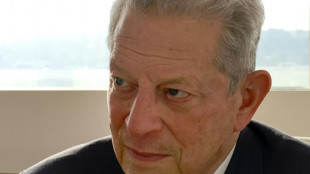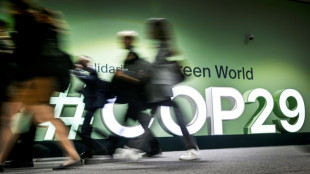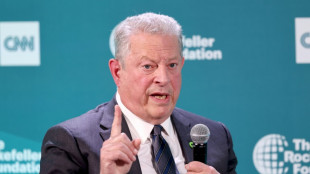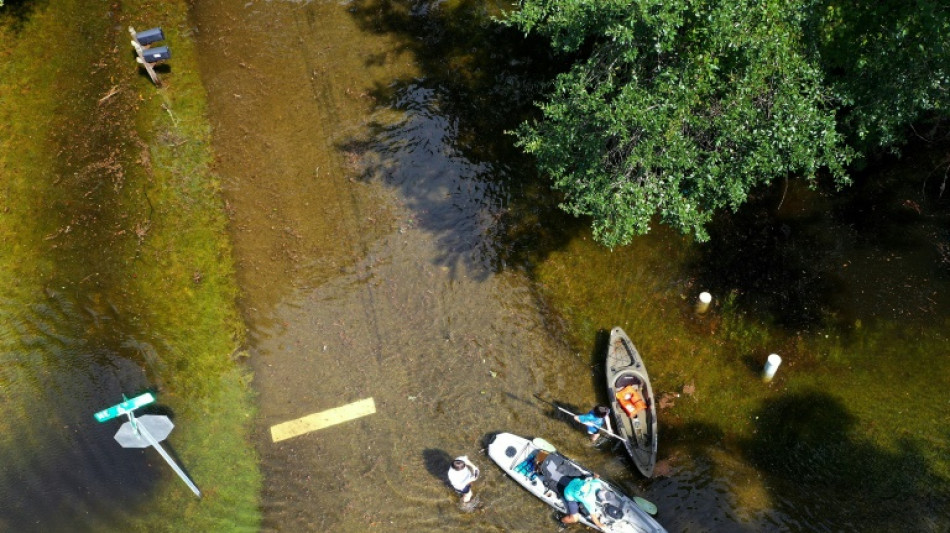
-
 Minister resigns but Dutch coalition remains in place
Minister resigns but Dutch coalition remains in place
-
Ireland won 'ugly', says relieved Farrell

-
 Stirring 'haka' dance disrupts New Zealand's parliament
Stirring 'haka' dance disrupts New Zealand's parliament
-
England's Hull grabs lead over No.1 Korda at LPGA Annika

-
 Kosovo players walk off in Romania after 'Serbia' chants, game abandoned
Kosovo players walk off in Romania after 'Serbia' chants, game abandoned
-
Kosovo players walk off in Romania game after 'Serbia' chants

-
 Lame-duck Biden tries to reassure allies as Trump looms
Lame-duck Biden tries to reassure allies as Trump looms
-
Nervy Irish edge Argentina in Test nailbiter

-
 Ronaldo at double as Portugal reach Nations League quarters, Spain win
Ronaldo at double as Portugal reach Nations League quarters, Spain win
-
Fitch upgrades Argentina debt rating amid economic pain

-
 Trump picks Doug Burgum as energy czar in new administration
Trump picks Doug Burgum as energy czar in new administration
-
Phone documentary details struggles of Afghan women under Taliban

-
 Ronaldo shines as Portugal rout Poland to reach Nations League last-eight
Ronaldo shines as Portugal rout Poland to reach Nations League last-eight
-
Spain beat Denmark to seal Nations League group win

-
 Former AFCON champions Ghana bow out as minnows Comoros qualify
Former AFCON champions Ghana bow out as minnows Comoros qualify
-
Poland, Britain reach BJK Cup quarter-finals

-
 At summit under Trump shadow, Xi and Biden signal turbulence ahead
At summit under Trump shadow, Xi and Biden signal turbulence ahead
-
Lebanon said studying US truce plan for Israel-Hezbollah war

-
 Xi warns against 'protectionism' at APEC summit under Trump cloud
Xi warns against 'protectionism' at APEC summit under Trump cloud
-
Nigerian UN nurse escapes jihadist kidnappers after six years

-
 India in record six-hitting spree to rout South Africa
India in record six-hitting spree to rout South Africa
-
George tells England to prepare for rugby 'war' against Springboks

-
 Pogba's Juve contract terminated despite doping ban reduction
Pogba's Juve contract terminated despite doping ban reduction
-
Ukraine slams Scholz after first call with Putin in two years

-
 Michael Johnson's Grand Slam Track series to have LA final
Michael Johnson's Grand Slam Track series to have LA final
-
Kagiyama, Yoshida put Japan on top at Finland Grand Prix

-
 Alcaraz eyeing triumphant Davis Cup farewell for Nadal after ATP Finals exit
Alcaraz eyeing triumphant Davis Cup farewell for Nadal after ATP Finals exit
-
Xi, Biden at Asia-Pacific summit under Trump trade war cloud

-
 India go on record six-hitting spree against South Africa
India go on record six-hitting spree against South Africa
-
France skipper Dupont says All Blacks 'back to their best'

-
 Trump pressures US Senate with divisive cabinet picks
Trump pressures US Senate with divisive cabinet picks
-
Bagnaia strikes late in Barcelona practice to edge title rival Martin

-
 High-ball hero Steward ready to 'front up' against South Africa
High-ball hero Steward ready to 'front up' against South Africa
-
Leader of Spain flood region admits 'mistakes'

-
 Swiatek, Linette take Poland past Spain into BJK Cup quarter-finals
Swiatek, Linette take Poland past Spain into BJK Cup quarter-finals
-
Leftist voices seek to be heard at Rio's G20 summit
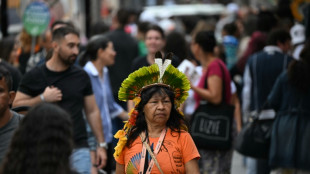
-
 Wales coach Jenkins urges players to 'get back on the horse'
Wales coach Jenkins urges players to 'get back on the horse'
-
Zverev reaches ATP Finals last four, Alcaraz out

-
 Boeing strike will hurt Ethiopian Airlines growth: CEO
Boeing strike will hurt Ethiopian Airlines growth: CEO
-
Springboks skipper Kolisi wary of England's 'gifted' Smith

-
 End of a love affair: news media quit X over 'disinformation'
End of a love affair: news media quit X over 'disinformation'
-
US finalizes up to $6.6 bn funding for chip giant TSMC

-
 Scholz urges Ukraine talks in first call with Putin since 2022
Scholz urges Ukraine talks in first call with Putin since 2022
-
Zverev reaches ATP Finals last four, Alcaraz on brink of exit

-
 Lebanon rescuer picks up 'pieces' of father after Israel strike
Lebanon rescuer picks up 'pieces' of father after Israel strike
-
US retail sales lose steam in October after hurricanes

-
 Zverev reaches ATP Finals last four with set win against Alcaraz
Zverev reaches ATP Finals last four with set win against Alcaraz
-
Kerevi back for Australia against Wales, Suaalii on bench

-
 Spate of child poisoning deaths sparks S.Africa xenophobia
Spate of child poisoning deaths sparks S.Africa xenophobia
-
Comedian Conan O'Brien to host Oscars


How climate change boosts hurricanes
Scientists are sounding the alarm on human-caused climate change's impact on hurricanes such as Idalia, which rapidly intensified over a warm Gulf of Mexico before making landfall in Florida on Wednesday.
Here's what you need to know.
- Record-warm oceans counter El Nino -
Back in May, the US National Oceanic and Atmospheric Administration (NOAA) predicted a "near normal" Atlantic hurricane season, which runs from June 1 to November 30.
That was in large part because of the El Nino global weather pattern, which causes a higher than average "vertical wind shear" in the Atlantic, which in turn suppresses hurricane activity.
"If you have big changes in the wind with height, that tends to import dry, lower-energy air into the core of a tropical cyclone and prevent it from strengthening," Allison Wing, an atmospheric scientist at Florida State University, told AFP.
But come August, NOAA increased its forecast prediction for the season to "above normal," based on ocean and atmospheric conditions "such as record-warm Atlantic sea surface temperatures" that "are likely to counterbalance the usually limiting atmospheric conditions associated with the ongoing El Nino event."
"It's been a sort of tricky year in terms of thinking about the whole seasonal forecast because we have these two opposing factors," said Wing.
- What is known about climate change -
One-eye catching example: on July 24 a buoy off the southern tip of Florida recorded an alarming peak temperature of 101.1 degrees Fahrenheit (38.4 Celsius), readings more commonly associated with hot tubs, and a possible new world record.
"Warm waters, both at the surface of the ocean and beneath, provide the fuel that intensifies tropical storms and hurricanes," said Michael Mann, a climatologist at University of Pennsylvania. "That allows them to both intensify faster and attain higher maximum intensities."
You still need the right conditions to lead to hurricane formation -- but when they come along, storms will take advantage of warming oceans to generate fiercer winds and cause bigger storm surges.
"You can think of climate change as sort of like loading the dice," added Wing. "There's still a variety of different possible outcomes for any individual storm, but you have a greater chance of having those high-intensity storms."
Apart from affecting the maximum intensity of hurricanes, climate change can also increase the amount of rain they are able to dump, Andrew Kruczkiewicz, an atmospheric scientist and researcher at the International Research Institute for Climate and Society at Columbia University, told AFP.
"The warmer the atmosphere is, the greater the capacity for water," he said. "This can mean increased intense precipitation events."
Kruczkiewicz added he was personally worried people who had moved inland to escape Idalia could find themselves caught nonetheless in extreme weather.
Last year, climate change boosted Hurricane Ian's rainfall by at least 10 percent, according to recent research.
- Seasons getting longer -
There's increasing evidence that the storm season itself is getting longer, as the window during which ocean surface temperatures support tropical storm formation begins sooner and ends later, said Mann -- a relationship that appears to hold true in both the Atlantic hurricane basin and the Bay of Bengal.
While there is ample research that climate change is making hurricanes more dangerous, whether it is also making them more frequent is much less certain and more study is required.
J.Bergmann--BTB

